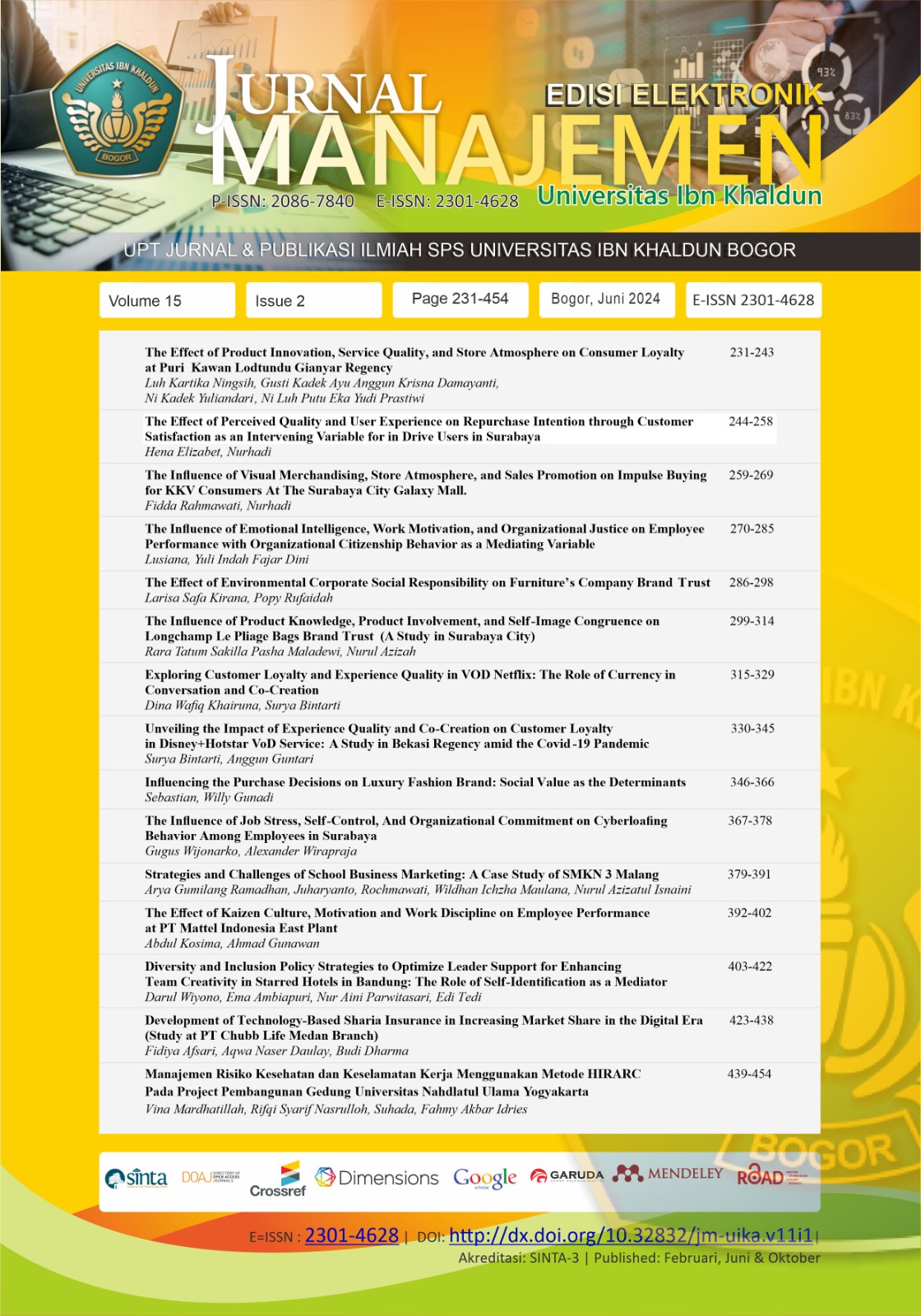The Effect of Environmental Corporate Social Responsibility on Furniture Company Brand Trust
DOI:
https://doi.org/10.32832/jm-uika.v15i2.16413Keywords:
Environmental, Corporate Social Responsibility, Brand TrustAbstract
As access to information on environmental issues grows, consumers are increasingly concerned about the impact that companies have on the environment. As a company that has implemented a Corporate Social Responsibility (CSR) program, it needs to pay attention to how its program impacts consumers. Therefore, this study was conducted to investigate how environmental CSR affects brand trust, including feasibility and intentions. The concept of environmental CSR in this study will use three dimensions which are environmental CSR, environmental philanthropy, and environmental customer wellbeing. These dimensions are adopted from previous studies that use environmental CSR as the main focus of the study. Hypothesis testing, validity, and reliability were conducted using PLS-SEM as the analysis methods. The results showed that environmental CSR has a positive and significant effect on brand trust.
References
Chaudhuri, A., & Holbrook, M. B. (2001). The Chain of Effects from Brand Trust and Brand Affect to Brand Performance: The Role of Brand Loyalty. Journal of Marketing, 65, 81–93. https://www.jstor.org/stable/3203382?read-now=1&seq=1#page_scan_tab_contents
Hair, J. F., Sarstedt, M., Hopkins, L., & Kuppelwieser, V. G. (2014). Partial least squares structural equation modeling (PLS-SEM): An emerging tool in business research. In European Business Review (Vol. 26, Issue 2, pp. 106–121). Emerald Group Publishing Ltd. https://doi.org/10.1108/EBR-10-2013-0128
Hamid, R. S., & Anwar, S. M. (2019). STRUCTURAL EQUATION MODELING (SEM) BER-BASIS VARIAN: Konsep Dasar dan Aplikasi dengan Program SmartPLS 3.2.8 dalam Riset Bisnis (Abiratno, S. Nurdiyanti, & A. D. Raksanagara, Eds.). PT Inkubator Penulis Indonesia. www.institutpenulis.id
Kim, Y. (2017). Consumer Responses to the Food Industry’s Proactive and Passive Environ-mental CSR, Factoring in Price as CSR Tradeoff. Journal of Business Ethics, 140(2), 307–321. https://doi.org/10.1007/s10551-015-2671-8
Kim, Y., & Chon, M. G. (2022). Exploring effects of message framing on supportive behaviors toward environmental corporate social responsibility. Corporate Communications, 27(4), 760–780. https://doi.org/10.1108/CCIJ-01-2022-0003
Limbu, Y. B., Pham, L., & Mann, M. (2020). Corporate social responsibility and hospital brand advocacy: Mediating role of trust and patient-hospital identification and moderating role of hospital type. International Journal of Pharmaceutical and Healthcare Marketing, 14(1), 159–174. https://doi.org/10.1108/IJPHM-04-2019-0029
Malhotra, N. K., Nunan, D., & Birks, D. F. (2017). MARKETING RESEARCH AN APPLIED APPROACH (5th ed.). www.pearson.com/uk
Martínez García de Leaniz, P., Herrero Crespo, Á., & Gómez-López, R. (2019). The role of en-vironmental CSR practices on the formation of behavioral intentions in a certified hotel con-text: Exploring the moderating effect of customer involvement in the buying process. Spanish Journal of Marketing - ESIC, 23(2), 205–226. https://doi.org/10.1108/SJME-10-2018-0044
Nariswari, S. (2022, September 20). Survei: Konsumen Indonesia Makin Peduli Produk Ramah Lingkungan Halaman. https://lifestyle.kompas.com/read/2022/09/20/184205220/survei-konsumen-indonesia-makin-peduli-produk-ramah-lingkungan?page=all
Rashid, N. R. N. A., Khalid, S. A., & Rahman, N. I. A. (2015). Environmental Corporate So-cial Responsibility (ECSR): Exploring its Influence on Customer Loyalty. Procedia Economics and Finance, 31, 705–713. https://doi.org/10.1016/s2212-5671(15)01159-4
Schill, M., & Godefroit-Winkel, D. (2022). Consumer responses to environmental corporate social responsibility and luxury. Journal of Services Marketing, 36(6), 769–780. https://doi.org/10.1108/JSM-11-2020-0472
Sung, K. S., & Lee, S. (2023). Interactive CSR campaign and symbolic brand benefits: a mod-erated mediation model of brand trust and self-congruity in the restaurant industry. Internation-al Journal of Contemporary Hospitality Management, 35(12), 4535–4554. https://doi.org/10.1108/IJCHM-08-2022-1027
Tiep Le, T., Ngo, H. Q., & Aureliano-Silva, L. (2023). Contribution of corporate social respon-sibility on SMEs’ performance in an emerging market – the mediating roles of brand trust and brand loyalty. International Journal of Emerging Markets, 18(8), 1868–1891. https://doi.org/10.1108/IJOEM-12-2020-1516
Williamson, D., Lynch-Wood, G., & Ramsay, J. (2006). Drivers of environmental behaviour in manufacturing SMEs and the implications for CSR. Journal of Business Ethics, 67(3), 317–330. https://doi.org/10.1007/s10551-006-9187-1
Downloads
Published
How to Cite
Issue
Section
License
Copyright (c) 2024 Jurnal Manajemen (Edisi Elektronik)

This work is licensed under a Creative Commons Attribution-NonCommercial 4.0 International License.
Authors who publish with this journal agree to the following terms:
- Authors retain copyright and grant the journal right of first publication with the work simultaneously licensed under a Creative Commons Attribution-NonCommercial-ShareAlike 4.0 International License that allows others to share the work with an acknowledgement of the work's authorship and initial publication in this journal.
- Authors can enter into separate, additional contractual arrangements for the non-exclusive distribution of the journal's published version of the work (e.g., post it to an institutional repository or publish it in a book), with an acknowledgement of its initial publication in this journal.
- Authors are permitted and encouraged to post their work online (e.g., in institutional repositories or on their website) prior to and during the submission process, as it can lead to productive exchanges, as well as earlier and greater citation of published work (See The Effect of Open Access).











